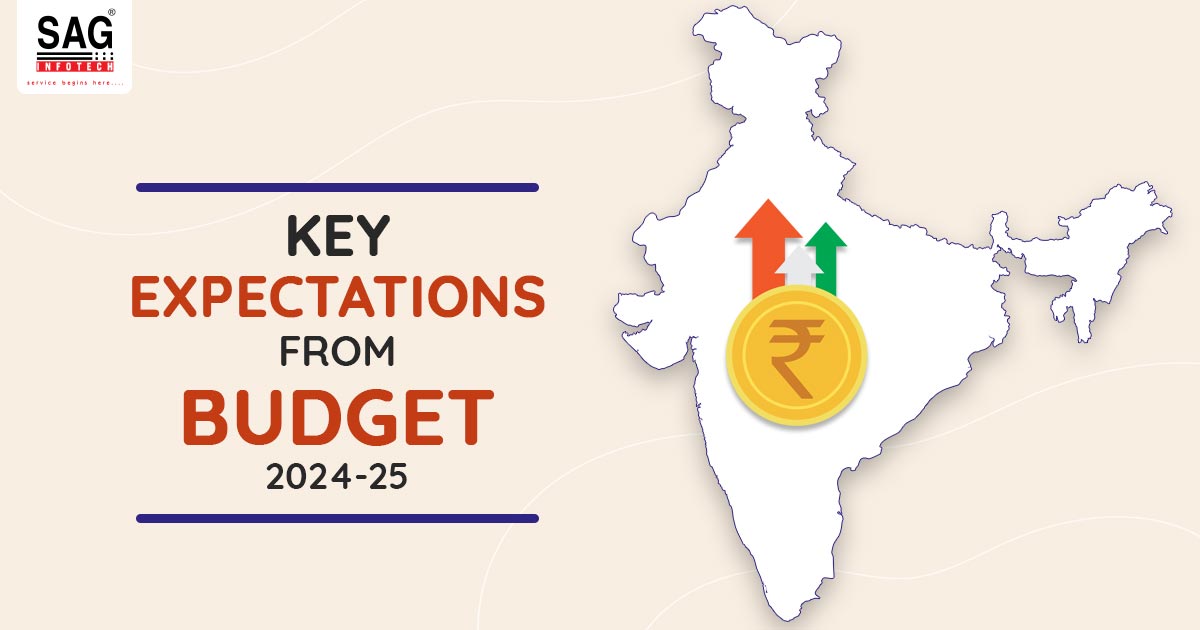
In this post, you can find the key expectations of the Modi 3.0 government for the Union Budget FY 2024-25. We anticipate the Budget for 2024 to be announced in the second half of July 2024, after the conclusion of the Lok Sabha Elections 2024. This follows the National Democratic Alliance (NDA) securing a third consecutive term at the Centre.
Economic growth is most likely to be prioritized in this budget without elevating the inflation graph and drawing equitable development in infrastructure, agriculture, and other sectors.
The same blog concentrates on 2024 budget expectations that are yet to be announced.
What Will be the Expected Date of Union Budget 2024?
However, the government has not released the official announcement, Budget 2024 for FY 2024-25 is anticipated to be in the second half of July.
On July 23 or 24, the union budget is likely to be announced by FM Nirmala Sitharaman.
From July 22, 2024, the monsoon session of Parliament will commence and carry on till August 09, 2024. On 20th July 2024, multiple pre-budget consultations are anticipated to be conducted with industry leaders and finance ministers of different states.
On June 22, 2024, the 53rd GST Council announced the recommended amendment.
Key Expectations from the Union Budget 2024
Budget 2024, is anticipated to make satisfactory announcements in favour of salaried individuals. Here are our top expectations:
1. Rising Home Loan Interest
It is anticipated that the tax deduction u/s 24(b) for a deduction on interest on a home loan of Rs 2 lakhs shall surge from Rs 3 lakhs, as a part of promoting homeownership. It is said to surge the chances of individuals buying a residential property which shall assist in increasing the real estate sector and enhance personal finance.
2. Increase in the Limit of Tax Exemption
Anticipation is there under the new tax regime, the tax waiving limit shall be surged to Rs 5 lakhs from Rs 3 lakhs. However, government priorities, economic rise, and other aspects are been regarded to raise the exemption limit.
3. Limit of Tax Deduction 80C
For section 80C the deduction limit for any investment made on the life insurance premium, contribution to PPF, FD, ELSS, etc, raising the limit for section 80C is expected to be Rs 2 lakhs from Rs 1.5 lakh. The same has not been revised since 2014 and amending the limit shall be a relief for assessees.
4. 50% HRA Exemption on Non-Metro Cities
Salaried individuals obtain HRA exemption as an allowance, however, it is waived merely under the old tax regime (optional regime). Exemptions permitted depend on whether they reside in a metro or non-metro city. HRA is waived is normally the lowest of the following;
- Rent paid minus 10% of basic salary
- Actual HRA received
- 50% (metro city) of basic salary or 40% (non-metro cities) of basic salary
But, metro cities such as Chennai, Delhi, Mumbai, and Kolkata are included for 50% under the Income Tax Act, and the rest of them come under the 40% category.
To claim HRA in this Union Budget of 2024, the government is anticipated to reassess the norms with more people relocating to metro cities.
5. Amnesty Scheme for Customs
There is escalating anticipation regarding the launch of an Amnesty Scheme for Customs. This scheme could offer a one-time chance for businesses and individuals to voluntarily disclose and settle previous customs duty obligations without incurring severe penalties or legal consequences. This initiative can significantly promote compliance, increase revenue collection, and cultivate a more transparent business environment.
6. Social Security Fund
To set up a fund for a social security scheme Central Trade Unions have presented their memorandum providing a minimum pension of Rs 9,000 for unorganised and agricultural workers. The same has been anticipated to re-establish the Old pension scheme (OPS).
Read Also: Union Budget 2024: Expectations for Economy and GST Reforms
7. Green Taxation
In line with its climate goals under the Paris Agreement, India is considering green taxation as an essential tool to promote environmental sustainability. One of the proposals being discussed is the implementation of a carbon tax on industries with high carbon emissions. This move aims to incentivize industries to embrace greener technologies, while also generating revenue that can be invested in sustainable projects.
Tax incentives may be available for companies investing in renewable energy projects, energy-efficient technologies, and sustainable practices. These incentives could include accelerated depreciation for green investments and lower corporate tax rates for companies that meet sustainability benchmarks.
8. Development of PLI Schemes
It has been expected by the industry to expand PLI schemes to comprise more sectors. From the scheme at present sectors such as electronics, pharmaceuticals, and textiles get an advantage. Extending it to sectors like semiconductors, renewable energy, and advanced automotive components can strengthen India’s manufacturing capacities. To maintain and improve the momentum, an upsurge in budget allocations for existing PLI sectors is anticipated.
9. Digitization of the Litigation Process
As India undergoes digital transformation in various sectors, the digitization of the customs litigation process is becoming a crucial area for reform sought after by businesses in India. The Union Budget 2024-25 provides an opportune moment to implement measures to digitize and facilitate customs litigation. This could greatly improve efficiency, transparency, and the ease of doing business.
Closure: India Inc. is hopeful that the Finance Minister will consider the industry’s expectations and recognize that these initiatives are a comprehensive roadmap for sustainable and inclusive growth. Union Budget 2024-25 expectations are a testimony to its influentially shaped India’s economic future.
The coming budget can designate the foundation for the long-term prosperity of India by driving industrial innovation and fostering a resilient and sustainable economy. There could be a joint anticipation that it shall address concerns and coordinate for the transformative economic progress, as the nation awaits the budget announcements.









